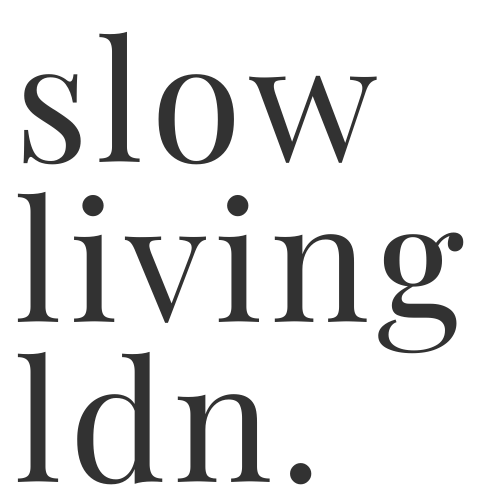You have no items in your cart. Want to get some nice things?
Go shopping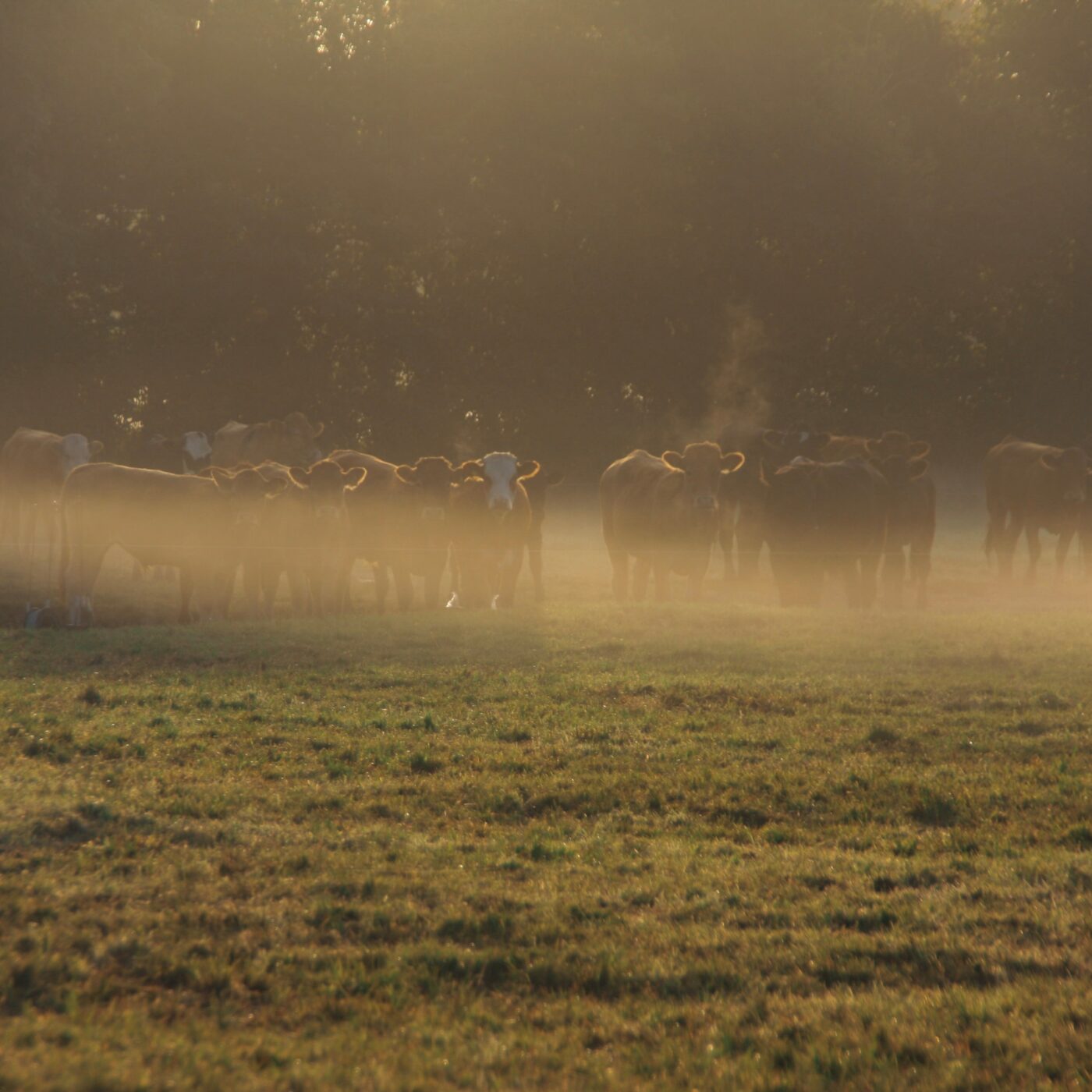
After a decade of fast-paced city life in London, Charlie White joined his family’s multi-generational farming business in the heart of Somerset. For the past ten years, The Slow Farming Company has been championing an alternative to large scale commercial meat production inspired by the slow food movement. At its heart is the adoption of regenerative farming and grazing principles which reinvigorate soil biodiversity and organic matter to help draw down carbon and improve the water cycle.
During our conversation, Charlie shares how our fast pace of life has left many “with little or no time to sit, think, and consider anything”. To him, slow living is “taking the time to consider things a bit more deeply”. The Slow Farming Company advocates for a greater understanding of the “true costs of cheap meat” and the benefits of regenerative farming, from nutrition and animal welfare to flood and drought resilience.
In this thought-provoking interview, Charlie offers us all a moment to pause and reflect on a slower approach to food production.
In conversation with Charlie White, The Slow Farming Company
Tell us about the history and values of your family business, The Slow Farming Company.
Charlie, The Slow Farming Company: “Our family has been farming just outside Castle Cary in Somerset for five generations, and it is very much a family business, with generations four, five and six (still in training) currently living on the farm.
Rob, my stepfather, was at the forefront of our move to regenerative farming in 2014, when it was still considered a fringe idea, and he is still the person on the ground doing the day-to-day hard work on the farm alongside my brother, Ed. Rob was driven by a conviction that there must be a better way to produce his meat and eggs, without ruining the land for future generations.
My mother, Sally, runs the egg side of the business (often helped by a grandchild) together with undertaking the farm admin. My sister-in-law, Camilla, and I run the online farm shop, marketing, and events side of the business. Ed and my wife, Lynn, are also heavily involved with our outside catering in particular, using our half-ton BBQ made from reclaimed metal found on the farm.”
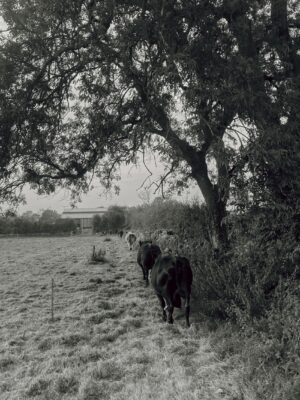

What does regenerative farming mean to you and how are you embracing it at The Slow Farming Company?
Charlie: “Ultimately, the soil is front and centre of all that we do here – if you get the soil right, the rest will follow. The mainstream agricultural combination of intensive tilling/ploughing, lack of cover crops, synthetic fertilizers and pesticide use has left farmland stripped of the nutrients, minerals, fungi, and microbes that support healthy plant life.
Recent research suggests that conventional farming is using up topsoil at around ten times the rate that it is being replaced. This means we could only have around 60 years of topsoil left. Without it, the soil’s ability to filter water, absorb carbon and feed people plunges. Not only that, but the food we do grow will probably be lower in vital nutrients.
Regenerative agriculture describes farming and grazing practices that aim to reverse climate change, creating resilient ecosystems, by rebuilding soil organic matter and restoring degraded soil biodiversity – resulting in both carbon drawdown and improving the water cycle.
In our case, this involves planting deep-rooted plants like Chicory, Sainfoin and Yarrow, to prevent loss of soil through erosion and run-off. We have to be very disciplined and not overgraze our fields. We work on the premise that the cattle should be eating a third, leaving a third and wasting a third as it is trodden into the soil. This, along with the manure that is also trodden in and the organically produced compost we apply, gives nutrients back and increases the levels of organic matter in the soil, improving both its quality and quantity.”
Tell us about your interpretation of slow food and the wider slow movement.
Charlie: “For us, ‘slow food’ is about taking a step back and taking the time to think about the whole system that ends up with food on your plate – what role we should play and, crucially, when we should keep out of the way.
“We try not to force the results we want and let nature take its course in the time it needs.”
We try not to force the results we want and let nature take its course in the time it needs. We have native breed cattle, cross-bred to ensure hybrid vigour, that have evolved to finish on grass and are outside in our fields for the majority of the year (we do bring them in when necessary). This does take longer, as we don’t feed whole grains – hence the name ‘Slow Farming’.
By using a mixture of grasses, herbs and some root crops, including those you might call weeds – their natural diet – they are able to extract many different nutrients. Being outside and having access to such a variety of plant material means that our animals are generally healthier and require less vet intervention. The more diverse the mixture, the more unique root and leaf forms there are to extract the different minerals, and the greater the nutritional benefit to those consuming the end product, be it beef, pork or eggs. It also tastes great! I think that thoughtful and considered approach is similar to what we see in the wider slow movement.”


Are there any other local or slow producers who have inspired you at The Slow Farming Company?
Charlie: “As to inspirations, two stand out. Both are trying, against all the odds, to push the UK towards sustainable and regenerative agriculture at scale. They are:
- Patrick Holden (Farmer and Chief Executive of the Sustainable Food Trust). Among many other things, Patrick Holden and the SFT have produced a well thought through report setting out how the whole of the UK could move to sustainable agriculture and still feed ourselves.
- Sue Pritchard (Farmer and Chief Executive of the Food, Farming, and Countryside Commission). In a similar vein, Sue Pritchard and the FFCC have put together key policy ideas for the government pushing for a fairer food system and backing for sustainable and regenerative farming.”
What can individual consumers do to support regenerative farming and a slower approach to food production?
Charlie: “There are a number of ways consumers can support regenerative farming:
- Buy direct from regenerative farms – they can buy from our online farm shop – we deliver frozen beef and pork across the UK (excluding Highlands & Islands). Alternatively, search online for other regenerative farms, read about what they are doing differently, and try to buy direct from them. Although supermarkets are starting to stock some regenerative produce, their business model is still not fair to the farmers, so if you can buy directly from a regenerative farm, you will know that all your money is going back into supporting regenerative farming rather than to the supermarket’s corporate shareholders.
- Tell your friends – let them know about the significant benefits that flow from regenerative farming and its produce (nutrition, climate, animal welfare, ecosystems, biodiversity, topsoil regeneration, and flood and drought resilience).
- Tell your MP – if you feel so inclined, ask your MP to read the above report by the SFT and the policy ideas put forward by the FFCC to support the UKs transition to a sustainable and regenerative future.”
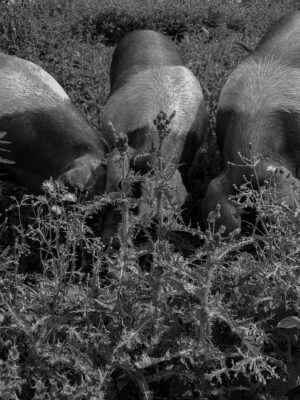
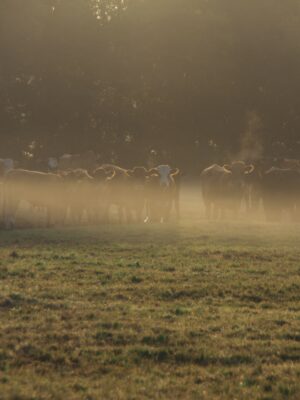
Often people misunderstand ‘slow’ for navigating life at a snail’s pace, rather than ‘considered’. How do you balance the fast pace and pressure of business ownership with slow living?
Charlie: “I think a lot of people, maybe even a majority of people, have been caught on a treadmill set to an ever-increasing speed – “more and quicker equals better”. We see it in our work life (always available by email or phone) and in our private lives (infinite scrolling of social media, on-demand TV and films, and 24-hour news). All this means is that we are left with little or no time to sit, think, and consider anything. I certainly found this during my 10 years on the treadmill in London. I think the ‘slow’ movement is a reaction to this – it is more about trying to slow down to a more natural pace of life, rather than actually being slow, and taking the time to consider things a bit more deeply.
“…it is more about trying to slow down to a more natural pace of life, rather than actually being slow, and taking the time to consider things a bit more deeply.”
On a personal level, you may take the time to work out what you really want from life, including for your family and the environment, and you may find that you actually don’t need a lot of the things that society has taught us to desire (newer car, bigger house, more money, etc.). I recently heard a quote that seems very apt – at a party given by a billionaire, Kurt Vonnegut tells Joseph Heller, that their host, a hedge fund manager, had made more money in a single day than Heller had earned from his popular novel Catch-22 over its whole history. Heller responds, “Yes, but I have something he will never have… enough.”
In relation to our business, it’s easier said than done but we try not to react to circumstances with quick fixes – with a bit of thought you can usually come up with a better solution that saves more time and/or money in the long run. You have to give yourself that space knowing that a considered solution will ultimately benefit you and your customer. We are also very fortunate to have a business that means we get to be outside in nature a lot of the time.”
You can visit The Slow Farming Company’s online shop to discover pasture-reared beef and pork, including the family’s award-winning grass fed beef mince, plus eggs and local artisan homewares.
Image credits: The Slow Farming Company
